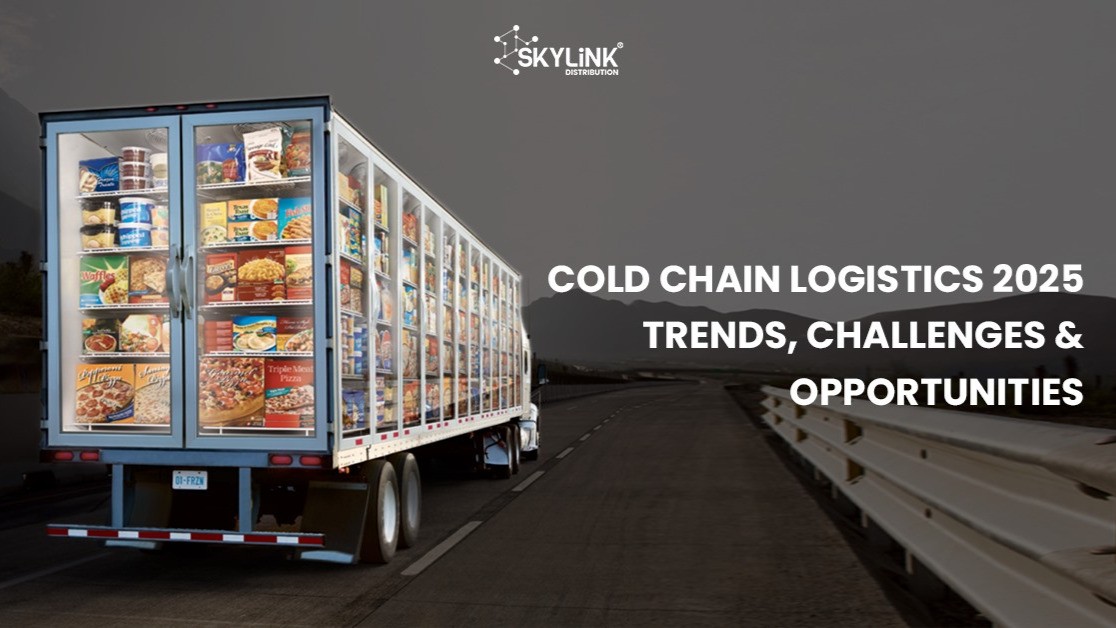Cold Chain Logistics 2025: Trends, Challenges & Opportunities

The need for effective logistics is growing rapidly in the fast-paced world of today, particularly for temperature-sensitive goods. Cold chain logistics is essential to maintaining the safety and efficacy of items, ranging from fresh food to life-saving medications. Businesses such as Skylink are at the forefront of rewriting industry norms, guaranteeing seamless manufacturing and delivery processes. However, where is this sector going? What opportunities and difficulties might we expect in 2025? Let's get started.
___________________________________________________________________________
Understanding Cold Chain Logistics: More Than Just Refrigeration
Maintaining exact temperatures throughout the supply chain is the goal of cold chain logistics, which goes beyond simply keeping items cold. Even a small temperature change can result in spoiling, monetary losses, and health hazards for perishable commodities, frozen meals, and medications. Because of this, effective cold chain management is crucial for companies all over the world.
The Growing Role of Cold Chain Management in the Food Industry
Cold chain management is crucial to the food industry's ability to maintain product freshness and safety for human consumption. Controlling the temperature is essential from farm to fork. The need for strong cold storage supply chains is only going to grow as e-commerce and international trade grow. Automation, tracking systems, and refrigeration technological advancements are assisting businesses in meeting customer demands.
What Are Cold Chain Logistics and Why Are They Important?
To put it simply, cold chain logistics is the process of moving and keeping items that are sensitive to temperature. It is impossible to overestimate the significance of cold chain logistics, which has an impact on everything from pharmaceuticals to agriculture. Food can go bad, businesses can lose a lot of money, and vaccines can lose their effectiveness if the cold chain is not properly managed.
___________________________________________________________________________
The Future of Cold Chain Logistics in 2025: Trends to Watch
A number of factors are expected to change the cold chain logistics sector as 2025 approaches.
1. Advancements in IoT and Real-Time Monitoring
Cold chain logistics are being revolutionized by IoT-powered tracking devices. Businesses can now precisely track temperature variations, humidity levels, and transportation conditions thanks to real-time monitoring. This promotes quality control and reduces losses.
2. Rise of Sustainable Cold Chain Solutions
Logistics firms place a lot of emphasis on sustainability. Businesses are reducing their carbon footprints by implementing energy-efficient warehouses, alternative cooling systems, and eco-friendly refrigeration techniques in response to growing environmental concerns.
3. The Shift to Active Cold Chain Systems
Because active cold chain systems provide dynamic temperature control, they are replacing traditional passive cold storage. This is especially helpful for frozen goods and medications that need to be continuously cooled while in transportation.
4. Expansion of Cold Chain Logistics in Pakistan and Emerging Markets
Pakistan and other developing nations are making significant investments in cold chain logistics. Better cold storage supply chains are becoming more and more necessary due to the expanding food export sector and growing healthcare demands.
___________________________________________________________________________
Challenges in the Cold Chain Logistics Process
Although the future appears bright, the sector nevertheless faces a number of challenges:
- High operational costs: Cold chain logistics is costly and necessitates specialized infrastructure and equipment.
- Lack of skilled cold chain engineers: More skilled workers who comprehend the intricacies of supply chains that are sensitive to temperature are needed by the sector.
- Regulatory compliance issues: International trading is complicated because various nations have different laws governing cold chain logistics.
- Technological integration: Even though IoT and AI are revolutionizing logistics, many businesses find it difficult to successfully implement these developments.
Opportunities in Cold Chain Logistics Jobs and Courses
The need for qualified workers increases along with the business. Opportunities for supply chain managers, refrigeration engineers, and logistics coordinators are among the growing numbers of cold chain logistics employment. Furthermore, courses on cold chain logistics, which provide specialist instruction in temperature-controlled supply chain management, are growing in popularity.
___________________________________________________________________________
The Role of Cold Chain Logistics Companies in Pharmaceuticals
The pharmaceutical industry is one of the most important industries that depends on cold chain logistics. Biologics, vaccines, and other medications that are sensitive to temperature need to be stored under exacting conditions. The integrity of these medications may be jeopardized in the absence of effective cold chain logistics, posing major health hazards.
___________________________________________________________________________
The Role of Cold Chain Logistics Companies in Pharmaceuticals
The pharmaceutical industry is one of the most important industries that depends on cold chain logistics. Biologics, vaccines, and other medications that are sensitive to temperature need to be stored under exacting conditions. The integrity of these medications may be jeopardized in the absence of effective cold chain logistics, posing major health hazards.
___________________________________________________________________________
Final Thoughts: The Road Ahead
In today's global supply chain, cold chain logistics is no longer merely a supporting role; it is now essential. The sector is expected to achieve unprecedented heights in 2025 and beyond as a result of growing environmental initiatives, technological advancements, and infrastructure investments from emerging countries. The moment to embrace the future of this changing sector is now, regardless of whether you are a logistics professional, business owner, or someone interested in cold chain logistics courses.
So, is the core of contemporary supply chains really cold chain logistics? Of course! The industry will continue to prosper with innovation and strategic planning, guaranteeing the safe and effective delivery of perishable commodities, fresh food, and life-saving medications.